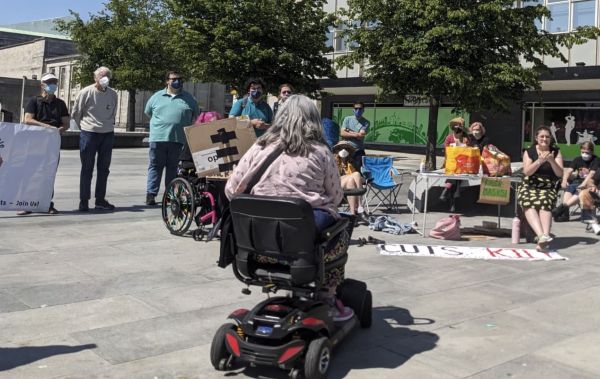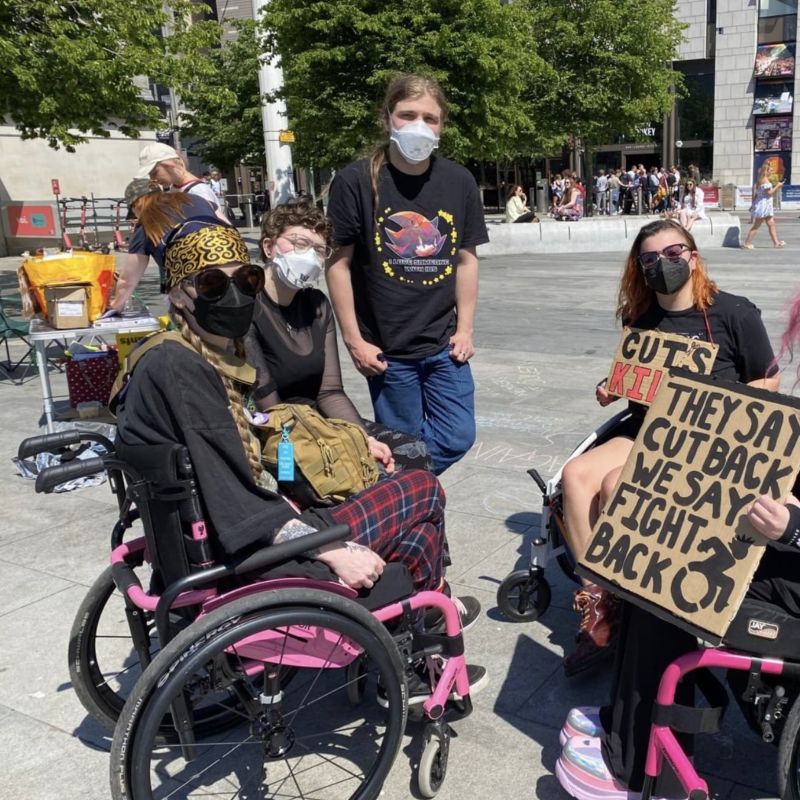By Manthan Pathak. Pictures by Andrea Barrett.
Local campaigners for disabled people’s rights staged a protest at Southampton’s Guildhall Square to bring attention to the government’s plans to cut disability benefits. A new nationwide grassroots group, Crips Against Cuts, created in opposition to the proposals, organised the demonstration, which was also attended by a broad coalition of groups including Disabled People Against Cuts (DPAC).
The proposed changes will impact disabled people in three principle ways: firstly, the tougher eligibility criteria for PIP (Personal Independence Payment) will make it more difficult for disabled people to qualify for the benefit; secondly the health element of Universal Credit will be cut for new claimants and frozen for existing claimants (a real terms cut); and thirdly disabled people under the age of 22 will not be eligible for PIP.
The planned disability benefit cuts will hit 700,000 families who are already in poverty, according to internal Department for Work and Pensions forecasts obtained by the Guardian. The figures, sourced under the Freedom of Information Act, are in addition to the projected 250,000 people who will be newly driven below the poverty line by the cuts, as set out by the government’s impact assessment in March.
DWP estimates 800,000 current and future PIP claimants would receive an average £4,500 less per year, while 2.3 million existing claimants would lose £500 per year from Universal Credit health payments and 0.7 million new claimants would receive £3,000 less per year on average. That’s well over 3 million disabled people affected by the cuts in the midst of an existing cost of living crisis.
While statistics are useful, they can, and do, feel abstract. It’s in the personal testimony of disabled people where the true impact of the proposed cuts is found, and where they can resonate emotionally with others. That’s why demonstrations like this are critical in giving people a platform to use their voice, often marginalised voices like the disabled community that are all too often unheard.

One of those voices was Fiona Holloway, from New Forest DPAC, who spoke. She said that “Disability is not the problem – ableism is. The real barriers we face are not our conditions, but a society that refuses to accommodate us, a system that cuts our support, and a government that prioritises war over welfare…the Government’s Green Paper on welfare reform isn’t reform – it’s a declaration of war on disabled people. Three million of the poorest, the sickest, the most vulnerable, are in the crosshairs…This isn’t just about benefits. It’s about dignity. It’s about saying: we are worth more than a wage. Our lives matter.”
A local disability rights activist from Portsmouth, Felix, described the situation for disabled people now: “I don’t currently get PIP, I’ve never had it. That’s not necessarily because my claim has been rejected, and there’s a reason why I didn’t apply until a couple of months ago. That’s because just needing a wheelchair, or just having chronic pain, or just not being able to work part-time does not qualify you for PIP. I have known people who are unable to work, and whose doctors have certified them as not being able to work, and they have been denied PIP. This is the situation as it currently is without any changes.”
“If you can walk more than 200 metres, even with crutches or a rollator (or any other mobility aid), according to the DWP you don’t have mobility impairment, which is bonkers. Do they care if you’re in a lot of pain (as you walk)? I don’t know…I don’t think so.”
“I wanted to make the point that the current system is horrific, so many disabled people are living in poverty, in terrible conditions, are living without the care they need, are having to pay out of their own pocket for the care they need – if they have that money in the first place. There are so many disabled people who are already suffering. There are so many (disabled) people who have died. There have been stories reported in the news recently about people dying in the most horrific conditions because their benefits were cut. That is the system as it is now. It is only going to get worse if they cut further.”
It was also rightly acknowledged that significant barriers exist for people with disabilities to access demonstrations, meaning that many who wanted to attend may have been unable to. While it’s impossible to know how great that number was, they were represented at the protest by chalk outlines of feet on the concrete.
One campaigner, Paris, sent this message that was read aloud: “My worth is not tied to my ability to work. If the government continues to say I am only valuable if I can work, they need to give me the tools to do so. That involves supporting me financially so I can afford to turn up to work in the first place, so I can afford my assistant dog that means I don’t have to rely on 24/7 carers that would cost the government far more money. So I can afford my mobility car because public transport is not accessible or available. So I can afford my mobility aids, my medications, my supplements, my braces, none of which is covered on the NHS. Without those things I cannot live, and I certainly cannot work. You cannot take away the funding that allows people to work in the first place. You cannot acknowledge that being disabled costs over £1k a month extra, then force disabled people into poverty and expect them to be OK with that. So, if you want to stay in power…stop treating the people who voted for you like dirt beneath your feet.”
It’s in the words of disabled people that we can find the anger, the disbelief, and the anxiety that these cuts cause. A terrifying anxiety that, as Ellen Clifford, the chair of DPAC, has reported, has led to many disabled people thinking about taking their own lives, knowing that they can’t survive if their benefits are taken away.
42 Labour MPs have written a letter warning the Prime Minister that the cuts are “impossible to support”, calling for a delay to the vote on the cuts scheduled for June so that a dialogue with disabled people’s organisations can happen. The letter has been signed by new and veteran MPs, from the left and right of the party, yet it is notable that neither of Southampton’s Labour MPs, Satvir Kaur and Darren Paffey, are signatories.
There is an online letter template for writing to MPs about the cuts, which you can find here: inclusionlondon.org.uk/campaigns-and-policy/act-now/stand-up-against-cuts-to-disability-benefits-write-to-your-mp-today/
While a harrowing uncertainty remains, one thing is clear: the disabled community and their allies will continue to resist the cuts – in the knowledge that lives depend on it.
To find out more about the local campaign visit: instagram.com/hampshire_crips_against_cuts
Or to join the national WhatsApp community: chat.whatsapp.com
- Can you help In Common pay our bills? We are trying to raise £500 to cover some of our annual running costs. Could you make a small donation to help keep this not for profit site running? gofund.me/3146626b

